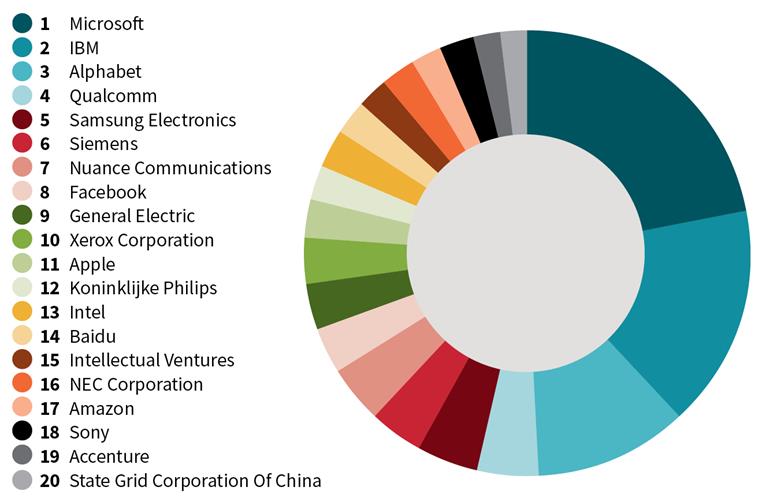Artificial intelligence (AI) is one of the biggest disruptive innovations of our time. While we are nowhere near the advancements we see in science fiction movies, this technology has already evolved to a high degree. Today, artificial intelligence has been adopted in customer service, media, education, healthcare, and manufacturing. Experts estimate that in the future, robots powered by this technology will be able to work with humans in manufacturing plants and lead to fully autonomous cars.
With the rate at which the technology is evolving, it is now time for companies to start looking at artificial intelligence intellectual property opportunities. Obtaining patents early on would secure a company’s position in this field. The banner image above shows the top AI patent holders.
Artificial Intelligence Intellectual Property Trends
In recent years, the number of filings for patents related to artificial intelligence has increased significantly. According to the World Intellectual Property Organization, a total of 21,011 patents were filed in 2016 – and all of these were related to computer vision. There is a 265% growth in the number of patents filed for AI robotics on an annual basis. There has been a similar increase in patent filings for control methods in artificial intelligence.
Currently, there are specific trends that we see in artificial intelligence intellectual property filings. Let’s take a look at a few of these trends:
- A significant increase in interest for filings related to neural networks has been noted. Many of the companies submitting applications for neural network technologies focus on machine translation services.
- There is also a consistent increase in deep learning filings, with an average annual growth of 174.6%. Speech recognition is currently considered one of the most trending applications for deep learning.
Trends by Industry Verticals
We also see an increase in filings among specific industrial applications. It is reported that a major trend is seen in the transportation industry. There is a 134% annual increase in the number of IP filings related to artificial intelligence in the industry.
Following just behind with an 84% annual increase is the telecommunications industry, where we see more advancements in AI assistants, speech recognition, and similar features.
The personal computing industry is also trending when looking at artificial intelligence intellectual property. A 36% annual increase in filings related to personal computing technologies has been noted.
Governments Are Taking Notice of Artificial Intelligence Intellectual Property
Artificial intelligence intellectual property is high up on governments’ and watchlists. Futurist Ray Kurzweil had predicted that by 2099, machines will have been granted the same legal rights and freedoms as humans.
AI patents have also made waves in the United Kingdom. In 2020, the UK government released an official publication advising on its view regarding patents that are related to artificial intelligence. There are two primary areas of focus in this publication. The article notes that artificial intelligence needs to be recognized as an inventor in the coming future. With artificial intelligence technology becoming smarter, the authors note that AI can be used to invent novel technologies. The current debate revolves around whether or not the AI technology itself would be considered the inventor behind a new invention – as there are specifications that need to be met when an AI patent is filed.
With this in mind, some difficulties may be faced among those who are seeking ways to use artificial intelligence in the development of new inventions. At the moment, there are still questions regarding how such developments would fit into the legal system in the UK. Artificial intelligence intellectual property experts suggested that exclusions listed by local laws in the UK may play a role in this decision – as these might be used in order to qualify a technology or invention produced by artificial intelligence.
Conclusion
The future for artificial intelligence is looking bright, and many brands are filing patents and considering the implications. There is already a large number of artificial intelligence patent filings already made, with more to come in the future. AI is not yet truly capable of inventing all on its own, i.e. without human input. Patent offices like the European Patent Office (EPO) and the UK Intellectual Property Office (IPO) do not yet recognize AI as patent inventors – that title is still reserved for humans. For help with artificial intelligence or machine learning patent litigation, please contact Sidespin Group’s machine learning experts.
References
https://builtin.com/artificial-intelligence/artificial-intelligence-future
No tags for this post.

